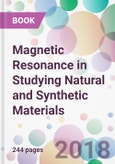This book describes nuclear magnetic resonance (NMR) methods which are used to study translational dynamics of molecules in different complex systems including systems made of synthetic and natural polymers, tissues and the porous heterogeneous systems of different types, such as cement and wood. The results of proton spin-lattice and spin-spin relaxation, cross-relaxation, pulse field gradient (PFG) NMR in studying diffusion properties and dynamics of molecules in polymer systems of different complexity are reported.
In addition to these methods, reports on the use of the double-quantum-filtered (DQF) NMR technique in a study of slow molecular dynamics and properties of systems with anisotropic properties, such as water in hardening cement pastes, are presented. The book also covers applications of one and two dimensional NMR techniques.
This book is a useful reference for readers learning different NMR techniques and their applications in civil engineering and biochemistry.
Table of Contents
Chapter 1 Basic Principles Of NMR and Experimental Techniques Introduction to NMR
Chapter 2 Dynamic Properties of Bound Water in Natural Polymers as Studied by NMR Relaxation
Chapter 3 NMR Diffusion Studies of Water in Natural Biopolymers
Chapter 4 Collagen Tissues with Different Degree of Cross-Links and Natural Silk as Studied by H DQF NMR
Chapter 5 NMR Relaxation and Restricted Self-Diffusion of Water in Wood
Chapter 6 2D Diffusion-Diffusion Correlation NMR Spectroscopy on Study of Diffusion Anisotropy in Wood
Chapter 7 PFG NMR In Studying Solutions of Carboxylated Acrylic Polymers
Chapter 8 Copolymer Films Swollen in Water: NMR Relaxation And PFG NMR Techniques In Studying Polymer-Water Interactions
Chapter 9 Magnetic Resonance Imaging in Characterisation of Polymer Films
Chapter 10 Self-Diffusion of Water in Cement Pastes as Studied by PFG NMR and Ddcosy NMR
Chapter 11 Characterisation of Hydrated Cement Pastes by DQF NMR Spectroscopy
Subject Index
Author
- Victor V. Rodin








